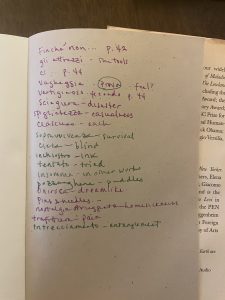Whenever someone asks about my favorite writer, I always talk about Jhumpa Lahiri. She has been my “favorite” since I read her during my time as an undergrad student. Yet there’s something that feels almost childlike in speaking about my “favorite” author. Maybe because a lot of time must pass in order to establish this label. And perhaps it feels childish to have favorites at all. For example, the idea that having preferences is immature, and being amenable to many things in the harsh reality of day to day life is the norm. To mature is to experience and enhance one’s appreciation as we encounter more things. And to mature is to be discerning.

I first read Lahiri’s debut novel, The Namesake. The book was part of Danbury, Connecticut’s One Book One Community project in 2008. The author came to our campus to give a talk about this book at the conclusion of the community project. I have written about book talks before, and this one was pretty similar. I cannot remember any of the specifics discussed but I still have my signed copy of the book. The novel focuses on the experience of immigration and existing between two cultures. I loved her storytelling and writing style, so I quickly sought out her short stories, Interpreter of Maladies. This collection won her the Pulitzer Prize for Fiction in 2000. Her short stories still resonate with me as her strongest genre. (I tend to be a big fan of short stories- I love J.D. Salinger’s. )
I see a thread between her beautiful short stories and her current works. She is described as a minimalist writer. Her prose is concise and she often writes in present tense and first person. She is a true writer’s writer – integrating style and the use of words themselves. A major part of this lies in the fact that she now exclusively writes in Italian and her works are then translated into English. Check out this New Yorker article as a primer to her writing style and intro to her journey of language mastery.

When I found out that my “favorite” writer is equally entranced by Italian language and culture as I am, the deal was sealed. I have studied Italian since the final semester of my undergraduate studies. My background in music and love of opera started the obsession, but the coffee and movies really got things rolling. I have traveled to Italy to visit and study seven times. I happened upon a signed copy of Lahiri’s In Other Words/In altre parole in a bookstore not long after it was published in 2016. Even though I manage social media, I’m not too present as a fan. This was the best way I could imagine learning about this side of my favorite author, through her work itself. I picked up the book and then realized that it was written half in Italian and half in English. She wrote the book in Italian and Ann Goldstein translated it into English. Lahiri challenged herself to write only in Italian in order to expedite the process of expressing herself more fluently in a foreign tongue (pen?). For anyone interested in Italian, I highly recommend picking up this memoir detailing her experience navigating this self-imposed obstacle.
I just finished reading Whereabouts, Lahiri’s most recent novel. I mistakenly thought that it would be presented in Italian/English and was disappointed to receive only the English translation (all the more reason to go to an actual book store!). I will read the original Italian next (Dove mi trovo), but must say that I really enjoyed the translation. The translation retains the strained feeling of searching for words, while the writing effortlessly conveys the complexity of character of the unnamed narrator.

Here’s a taste: “I watch her as she cycles through the piazza. She could be my daughter given that I’m thirty years older. But she’s already a woman, with a beauty that’s disarming. A girl who smiles as she speaks, as if to declare to the world, See how happy I am. Nothing like I was at that age: still a child, no boyfriends, ill at ease. I’m envious. I still regret my squandered youth, the absence of rebellion.”
The story traces the solitary life of this mystery woman living in an undefined city in Italy. As we read the narrator’s musings on her solitude, larger questions about life and its absurdities surface – an amazing feat based on the limited character material Lahiri provides from the outset. The book is short and a perfect selection for a relaxing read, soothing the eyes and mind after much too much screen time (speaking for myself). If you don’t already know Jhumpa Lahiri’s work, check it out. The “favorite” designation is highly personal, but yours may have some competition.